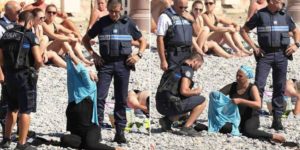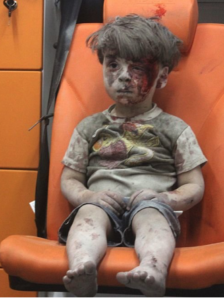 The highest administration French court (Conseil d’Etat) today overturned the ban imposed on some French beaches and swimming areas of women wearing a “burkini”, a swimming suit that covers the body and includes a hood. The ban has led to the strange scene in the photo above, of four policemen at a beach in Nice forcing a Muslim woman to remove some of her clothing. The ban follows other measures in France that have sought to use the tradition of laïcité, the strict separation of church and state, to prevent the wearing of head scarves in schools or the burka when driving. The measures have been widely seen as discriminatory, as they target Muslim women. If integration of immigrants is socially desirable, forcing Muslims either to reject traditions and religious beliefs or to stay away from public spaces does not seem to be an effective strategy.
The highest administration French court (Conseil d’Etat) today overturned the ban imposed on some French beaches and swimming areas of women wearing a “burkini”, a swimming suit that covers the body and includes a hood. The ban has led to the strange scene in the photo above, of four policemen at a beach in Nice forcing a Muslim woman to remove some of her clothing. The ban follows other measures in France that have sought to use the tradition of laïcité, the strict separation of church and state, to prevent the wearing of head scarves in schools or the burka when driving. The measures have been widely seen as discriminatory, as they target Muslim women. If integration of immigrants is socially desirable, forcing Muslims either to reject traditions and religious beliefs or to stay away from public spaces does not seem to be an effective strategy.
There has been discussion recently in Germany as well of passing regulations aimed at how Muslim women dress, with suggestions from the state interior ministers representing the conservative CDU to ban the wearing of the burka and the niqab in public places including schools, government offices, court rooms and in traffic. A recent poll in Germany found that 81% of respondents favored simply banning the burka in Germany. It was exactly a year ago that Chancellor Merkel at a press conference famously commented “Wir schaffen das” (We will get it done) in the context of integration of the flood of refugees coming to Germany. At the time, she received considerable praise for her welcoming attitude, both within and outside of Germany. That positive assessment has changed considerably in recent months, following the attacks on women by foreigners New Year’s Eve in Cologne and other cities, and especially by a series of small-scale terrorist attacks in several German cities this July. It may even be that Merkel will be in trouble in the national election a year from now.
In a report from NPR today, the changing attitude in Germany was discussed in the context of a small town in Germany (population 280) struggling to integrate over 80 immigrants. The story illustrates that the difficulties of integration go well beyond appearance and language. Some of the immigrants took swimming lessons, but the locals were upset that they didn’t stay in their lanes – public behavior in Germany insists on Ordnung (order), meaning in a pool context, you stay in your lane. The rumor mill soon turned that behavior into intentional harassment of the Germans by the immigrants – it was not possible for the locals to accept that others would not have the same appreciation of what they likely saw as a universal human value, expressed through the proverb Ordnung muss sein (There must be order).

